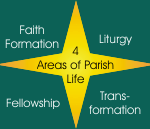It's our busyness, not our badness, that gets in the way of finding Christ
Article by Ron Rolheiser, OMI
Christmas is like a well-cut diamond. Every time you turn it in the sun, it gives off a different sparkle. It has many meanings.
One of these is that the God who's born into our world at Christmas is always being born into a world that hasn't got room for him and thus he is more easily seen and acknowledged by the poor and the culturally marginalized than he is by those who can afford their own homes, condos and hotel rooms.
When the gospels write up Jesus' birth, they surround it with a series of symbols that, precisely, point this out: They emphasize that, because those with power influence and affluence could not find a space for him ("There was no room at the inn"), the Christ Child was born outside the city, in a barn, in a feeding trough for animals, away from centres of influence, away from all that seems important hidden among the poor in a way that the rich and influenced can find him only if they're led there. For the poor, Jesus is as accessible as the village well, for the rich he's hidden away. Why?
Thomas Merton once put it this way: "into his world, this demented inn, in which there is absolutely no room for him at all, Christ has come uninvited. But because he cannot be at home in it, because he is out of place in it, and yet must be in it, his place is with those others for whom there is no room. His place is with those who are discredited, who are denied the status of persons, who are tortured, bombed and exterminated. With those for whom there is no room, Christ is present in the world. He is mysteriously present in those for whom there seems to be nothing but the world at its worst."
Christ is born into the world of marginalized more than into the world where power and influence reside.
This goes against our common conception, but the point is made consistently and without compromise throughout the whole gospels. The baby who's born at Christmas grows into the Jesus who tells us that there's a privileged presence of God within and among the poor, that the cross is erected where the outcasts are found, that the one who is rejected by society is central to the community, and (like the Jewish Scriptures before him) that the quality of our faith is to be judged by the quality of justice in the land and the quality of justice in the land is to be judged on the basis of how the weakest, not the strongest, fare. The birth of Jesus reverses Darwin’s famous evolutionary principle: God’s concern, unlike nature's, is not about the survival of the fittest, but about the survival of the weakest. God has a privileged presence in the powerless.
Why? Not because the poor are morally superior to the rich; but, if Scripture is to be believed, because the poor more easily make a place for God in their lives. Their stables and mangers are more available for God's birth than are our homes, condos and hospitals – not to mention our boardrooms, talk shows, college classrooms, sports arenas, and other centres of influence. Within virtually everything that our world judges to be important, there is no space for Christ to be born.
That's a message our culture needs to hear. It's not so much that we're insincere, ungenerous or morally deficient. Sincerity, generosity and moral fibre abound, even among the rich. Overall, we're good-hearted. The problem is more that we are star-struck, celebrity-obsessed, too much convinced that God's real blessings lies in being forever young, forever rich, forever good-looking, forever healthy, forever talented, forever important, forever busy, forever productive, forever admired and forever entitled to have something interesting to do. The seduction of all of this, which so much drives our culture and our souls, is the most powerful narcotic the world has yet produced. Like all narcotics, it's not so much a question of morality as of reality. It tends to make everything far, far from real.
And it also makes the crib hard to find. As the Christmas stories make plain, the God who was born into this world at the first Christmas and who is still trying to take on real flesh in our world cannot easily be found in the places where we – the young, rich, attractive, important, busy, productive, health and talented – do our stuff. And it's more our busyness than our badness that’s the problem. In our lives and in our world, perennially, there's no room at the inn, no place to welcome the God who wants to be born there. The Christ Child then, as at the first Christmas, must be born outside our city, among the poor, in places where we can find him only by letting ourselves be led by the poor, the children, or by some other guiding star.
|



